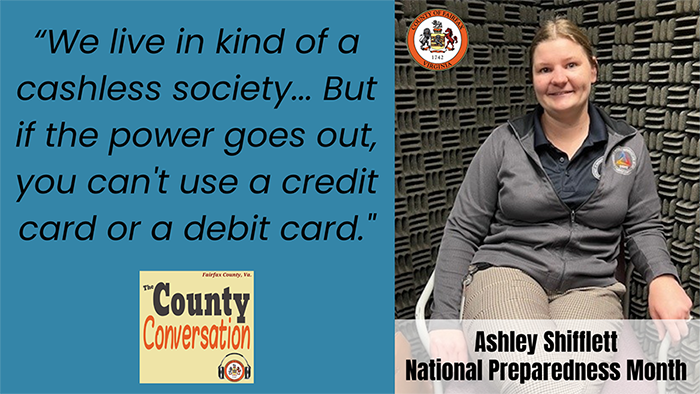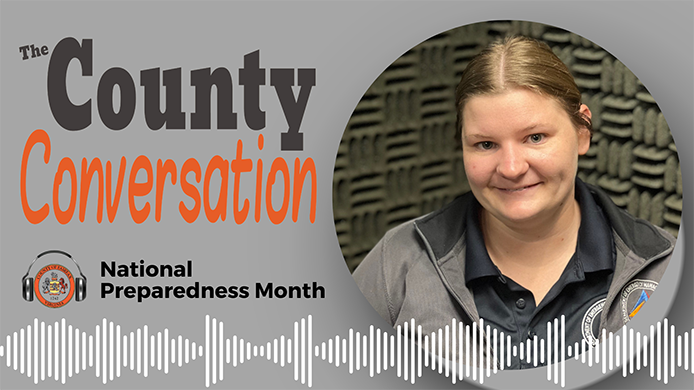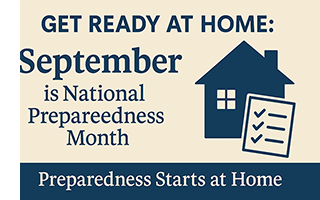Start With Your Household
This year’s focus on home preparedness makes sense when you think about it. Your house isn’t just about you – it might include children, elderly family members or pets. Each household member has different needs that require special planning.
“For most households, you might have children, you might have elderly loved ones that live with you. You might have pets,” Shifflett noted. “So just making sure that you’re prepared for everyone that lives in your house or in your household and thinking about those special needs.”
Basic Emergency Kit Essentials
Every household should have a basic emergency preparedness kit with enough supplies to last 48 to 72 hours (2-3 days). Here are the “must-have” items:
Food and Water:
- Non-perishable food items
- At least one case of water at home
- Three to four water bottles for car kits
Tools and Equipment:
- Battery-powered or crank radio
- Flashlight with extra batteries
- First aid kit
- Manual can opener
Personal Items:
- Cash (credit cards won’t work if the power goes out)
- Change of clothes appropriate for the season
- Travel-size hygiene products
- Medications (at least a week’s supply)

Special Considerations for Different Family Members
Pets
Pet owners need to think beyond basic kibble. Pet emergency kits should include:
- Collapsible food and water bowls
- Four days’ worth of food and treats
- Spare leash and waste bags
- Vaccination records and vet contact information
- Pet crates or carriers
Babies and Toddlers
Families with young children need extra planning:
- Formula (even if you don’t usually use it)
- Plenty of diapers
- Comfort items like pacifiers and favorite toys
- Mobile phone chargers for entertainment
- Extra clothes (babies go through lots of outfits)
Older Adults
Senior family members may need:
- Battery backup systems for medical equipment like CPAP machines
- Extra medications
- Community Connect registration (a Fairfax County service that alerts first responders about household special needs)
Common Mistakes to Avoid
The biggest mistake people make? Waiting until the last minute.
“If you wait to the last minute, I call them, you know, the toilet paper bandits that we saw during COVID,” Shifflett said. “People have already come to clear the shelves or prices are inflated.”
Instead, build your kit gradually by buying a few items each shopping trip. This spreads out the cost and ensures you’re not scrambling when disaster strikes.
Training and Community Resources
DEMS doesn’t just help residents prepare – they also train county agencies through exercises and simulations at the Emergency Operations Center. The department offers online courses for both county employees and residents, including:
- Introduction to Preparedness
- Five Step Neighborhood Preparedness Guide
- Houses of Worship preparedness
The Community Emergency Response Guide provides templates and detailed planning information. It’s available in multiple languages, including English, Spanish and Korean.
Community Connect, mentioned in the podcast, lets residents register special household information that first responders can access only when called to your address. Whether you have pets, family members with autism or other special considerations, this service helps emergency workers know what to expect.
Fairfax Alerts lets you receive important information on your cellphone and by email before, during and after emergency events. You can also sign up for severe weather alerts and general day-to-day news and information.
For complete emergency preparedness information, visit Ready Fairfax at www.fairfaxcounty.gov/emergency/readyfairfax. You can also follow Ready Fairfax on Facebook, X (formerly Twitter), Instagram and Nextdoor for regular updates and tips.
The County Conversation Podcast
The “County Conversation” is a podcast featuring employees and subject matter experts from the Fairfax County Government discussing programs, services and items of interest to residents of Fairfax County. For more, listen to past episodes of “County Conversation” and find other county podcasts at www.fairfaxcounty.gov/podcasts.

 This national observance began to honor the victims of the Sept. 11, 2001 terrorist attacks and help Americans better prepare for future threats.
This national observance began to honor the victims of the Sept. 11, 2001 terrorist attacks and help Americans better prepare for future threats.



 SIGN UP FOR DAILY EMAIL HEADLINES
SIGN UP FOR DAILY EMAIL HEADLINES